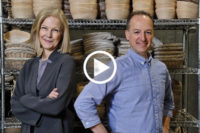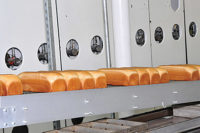When it comes to variety, Metropolitan Bakery is a master, generating as few as 3,500 pieces a day to as many as 5,000. Its breads and bakery goods range from pumpernickel rounds to organic miche, multigrain boules, raisin nut breads, scrumptious French-style baguettes, whole wheat loaves and French Berry Twist Rolls. Operating in a 10,000-sq.-ft. production facility in Philadelphia’s Fishtown neighborhood, owners James Barrett, chief baker, and Wendy Smith Born, retail/wholesale manager, and their team of 45 employees (75 counting the staffs at their four bake shops) have been baking delicious, hearty artisan creations for 20 years.
On the day of Snack Food & Wholesale Bakery’s visit, employees in the mixing room were hustling as usual, preparing country table breads and baguettes, while the pastry room team was making cornbread, muffins and raisin nut loaves that would later be sliced. The pervasive aroma of buttery bourbon-infused popcorn dominated the room. Accented with smoked almonds, the popcorn was being prepared near a stove, where its caramel coating had just been mixed in with a large spoon.
Bakery production at the plant stops only two days of the year (Christmas Eve and New Year’s Eve); otherwise, it runs full force, seven days a week. Bread orders placed before 3 p.m. are shipped two days later, while orders placed after 3 p.m. are shipped out within three days. The production facility operates in basically two-and-a-half shifts, Barrett says. “We start at 4 a.m. and begin baking, mixing and shaping throughout the day for the night shift and the next day. The night shift starts at 4 p.m.”
Born estimates that the crew can produce 3,500 to 5,000 items a day, depending on the season and special orders. Output is always higher on weekends, she points out. “The busiest times of year are the second and fourth quarters,” she says. “Most of our customers order more than one kind of bread, but there are some who only order baguettes.”
Rise and shine
“Most of the bread doughs take one to two days to rise,” Barrett explains. “It all begins with the starter culture, which is constantly fed and allowed to mature. We then mix the dough, shape and proof it, shape it again, proof it again and then bake it, so some of the breads can take 12 hours to make.”
Some breads take as long as 48 hours to prepare, depending on the type. “Each bread has its own schedule,” he says. “We don’t rush it. It has to take its time.”
Metropolitan has culled four main starters that the bakery crew has kept going from when Barrett worked at the White Dog Café restaurant, where he started baking bread: White; wheat; rye; and spelt. “These are the initial cultures,” he says. “The foundation for all of our breads are now about 26 years old. I created all of the bread for the restaurant and developed the recipes we use here.”
Artisan handling with a computerized twist
Much of the facility’s production equipment has been operating for a while. “We’ve been here for about 16 years now, so most of the equipment came from our first bakery,” says Barrett. “But we did add an oven last year and recently bought a new dough and roll divider. We add equipment as it’s needed. So we’re really true to the artisan description.”
Because the production of the bread involves a lot of handwork, Born and Barrett ensure that order processing and handling run efficiently via computerization. Orders processed in a second-floor office are entered into a computer sorting program and into a recipe PDF file. The production schedule file is sent to a computer monitor at the mixing station on the production floor, so the mixing operator can retrieve the information and knows what to make, how to make it, what shape to make it and how much of it to make.
In charge of perpetuating all of the starters, the operator then weighs out the ingredients into one of several standalone mixers and adds unbleached, unbromated flour into the mixing bowl, as well as water and other ingredients, including an all-natural rye starter, in this case. The starter bubbles as it sits in a drum and makes the dough mixture come to life as it’s added to the 400-lb. batch. The spiral mixers come from either Italy or France.
A bowl lifter then tilts the bowl and dumps the dough onto the table. The dough is then scaled and folded, which develops it further.
“Folding the dough is more gentle when you’re working with certain flours,” Barrett explains. “We fold the dough once and then fold it down again,” before it’s divided by hand and shaped.”
The bakers next place the divided pieces in round willow baskets lined with flour-dusted muslin, which keeps the dough from sticking and supports highly hydrated breads when they rise. The bakers also adhere to the production schedule, which they also receive, so that everything stays on time.
After the dough-filled baskets sit for about two hours to proof at room temperature, the dough is placed on racks, which are transferred to one of the walk-in retarders. “The dough stays in the retarder for 24 hours, and then the loaves are ready to be baked,” says Barrett. Proofing takes place at 40-48 deg. F, depending on the weather and time of year. “We try to control the lactic acid levels,” Barrett continues.
The doughs range in hydration from 60-80%, but that produces “really delicious bread,” he says. The humidity is set at around 60-70% in the dry winter and much lower in the summer. Once proofed, the racks of dough baskets are removed from the retarders and the dough is put on wooden peelboards or trays. “Some doughs can sit for 12 hours and once shaped, they can sit for another four hours, while others are put in the retarder for up to 14 hours,” Barrett explains.
Steam-injected ovens
In the oven room, there are two French steam-injection deck ovens that create a really crackly, crispy bread crust and two rotating rack ovens in which pastries and the granola are baked. “We use brick deck ovens for bread,” Barrett points out. “Most of our equipment is imported, so I’m at the mercy of equipment reps here or in New Jersey that have our parts in stock. Sometimes we run out of a part, so we have to wait for things to arrive from France or Italy.”
Fortunately, a handy technician/troubleshooter on staff saves the day on many occasions, Born points out. “Our technician is really clever, so if there’s a way of working around parts, he does,” she says. “The equipment is much more expensive than it used to be, and labor is expensive. Just getting things fixed can be very costly. We have a rather labor-intensive product that requires a lot of capital expenditures.”
Two operators load the deck ovens with bread dough using a semi-automatic feeding system that they jointly push into the ovens, hook, swing back and pull out, as the loaves of bread drop onto the brick oven floor on each deck. The decks vary in heat, with the first deck being the coolest.
Steam is then injected, which allows the crust that forms to caramelize, becoming a beautiful mahogany color, and allows the final expansion of the yeast. The breads bake from 25-30 minutes at 500 deg. F. “We pull a vent so that the steam can escape, which finishes off and sets the crust,” says Barrett. “Our two-lb. loaves take a full hour to bake and get dark and crusty.”
There are also two rack ovens for cakes, cookies, bars and pastries, popcorns, panbreads, granola, whole-wheat sandwich breads and rolls. Workers bake most items at 300-350 deg. F and bake certain types of bread at 400 deg. F for 30-40 minutes. “These ovens are also steam-injected,” Barrett continues.
The breads are also hand scored and/or decorated and can be stenciled with an “M” monogram. “We do that mainly on our levain,” he says.
Once baked, the breads cool on the racks before they are packed in large, brown paper sacks that are labeled and staged for the next delivery. The aroma in each room is incredible.
Metropolitan’s production bakery can go through as much as 15,000 lb. of flour and grain each week, Barrett says. “We haven’t seen dramatic fluctuations in the prices of grains this year, so perhaps the commodity problems we saw last year are leveling off,” he notes. “We try to keep on top of the changing ingredient prices and do the same with all of our paper and packaging products. When you’re dealing with anything that’s grower-produced locally or organic, you’re going to pay more for it, so you make adjustments accordingly.”
Inside the pastry room, raisin walnut pecan bread is sliced and laid out on trays, brushed with butter and dusted with cinnamon and sugar. The Bourbon-Infused Caramel popcorn with almonds is also being poured onto trays, ready for baking. Croissants and Danish also get special attention, and like the breads, begin with a starter, so they can take 24 hours to produce, Barrett points out. “We have an automatic sheeter in here for our croissants, Danish and breads, and it’s quite an art to learn to sheet things really well.”
Considering the future
Will the bakery be automating further? “If anything, we’ll automate the packaging of our packaged products, like the popcorn and granola,” says Barrett. “We might possibly evaluate bringing that function in-house.”
Lately, Born and Barrett have considered their 20 years in business, as their new cookbook, 20 for 20: Twenty Recipes Commemorating Twenty Years is just hot off the press.
“We’ve done a lot of ‘retro’ thinking lately because of our anniversary and some of the risks we took when we started out,” Born says. “Some of them were enormous, but when you’re young, the risks seem easy. Now, we have foresight and understand what we’re doing. We have the experience and are trying to figure out what’s personally gratifying for us and what’s next.”
Working so hard for a long time, the pair says they want to enjoy themselves a little more going forward. “We hope people appreciate that there’s a place— and always should be—for excellent handmade products, because quality makes a difference—it’s all in the details. It’s what makes life more livable and joyful. These days, we want to reach for joy.”
















